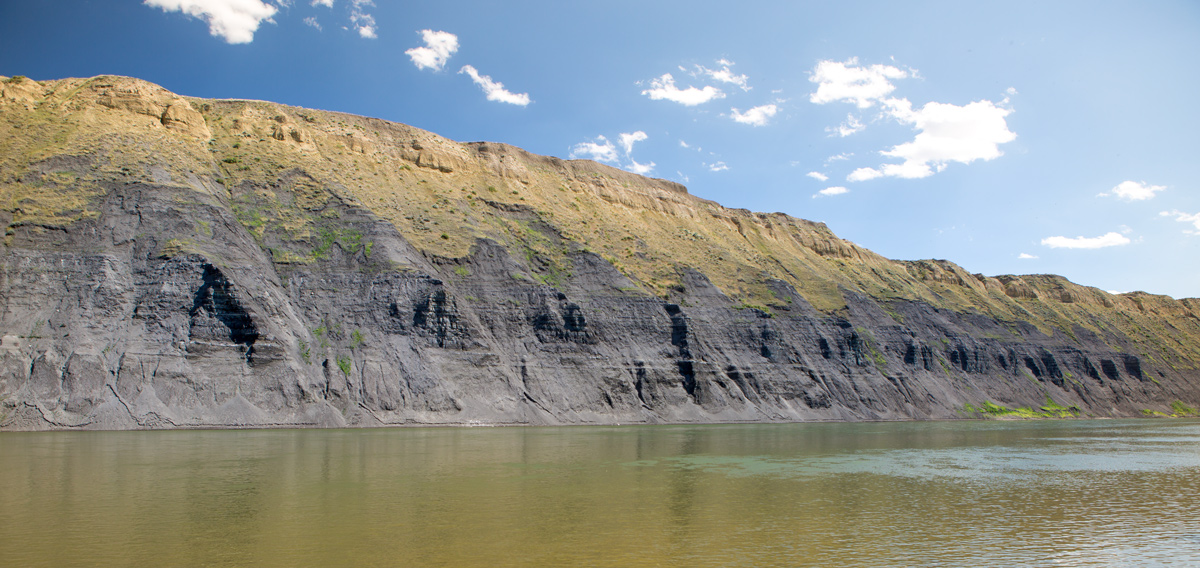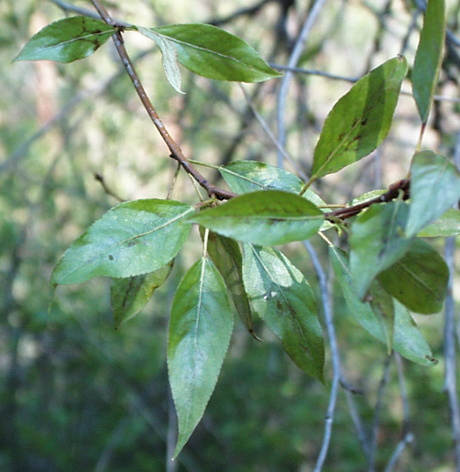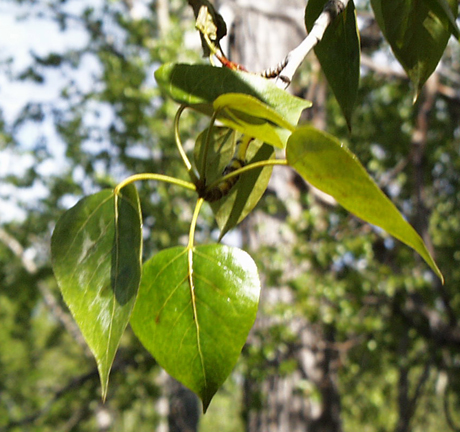Clark takes the boats up the Missouri past black bluffs and rattlesnakes nearly reaching present Fort Benton. Sacagawea remains ill.
Lewis hikes over the plains in search of the Great Falls of the Missouri, and he sees the Rocky Mountain Front. He has an encounter with a grizzly bear, describes two types of cottonwood trees, and then goes fishing.
Sacagawea Given Shade
The interpreters wife [Sacagawea] verry Sick So much So that I move her into the back part of our Covered part of the Perogue which is Cool, her own situation being a verry hot one in the bottom of the Perogue exposed to the Sun—
—William Clark
Blackish Bluffs near Fort Benton
© 30 Jun 2015 by Kristopher K. Townsend. Permission to use granted under the Creative Commons Attribution-Share Alike 4.0 International license.
Blackish Bluffs
the bluff are blackish Clay & Coal for about 80 feet. the earth above that for 30 or 40 feet is a brownish yellow, a number of bars of corse gravil and Stones of different Shape & Size &c.
—William Clark
Several Rattlesnakes
Several rattle Snakes has been Seen by the party to day one man took hold of one which was in a bunch of bushes as he was taking along the towing line, but luckley escaped being bit.
—John Ordway
Encouraging Grizzly Encounter
here we met with two large bear, and killed them boath at the first fire, a circumstance which I beleive has never happend with the party in killing the brown bear before. we dressed the bear, breakfasted on a part of one of them and hung the meat and skins on the trees out of the reach of the wolves. I left a note on a stick near the river for Capt. Clark, informing him of my progress &c.—
—Meriwether Lewis
Rocky Mountain View
we had a most beatifull and picturesk view of the Rocky mountains which wer perfectly covered with Snow and reaching from S. E. to the N. of N. W.— they appear to be formed of several ranges each succeeding range rising higher than the preceding one untill the most distant appear to loose their snowey tops in the clouds;
—Meriwether Lewis
Lewis Goes Fishing
This evening I ate very heartily and after pening the transactions of the day amused myself catching those white fish mentioned yesterday; they are here in great abundance I caught upwards of a douzen in a few minutes; they bit most freely at the melt of a deer which goodrich had brought with him for the purpose of fishing.
—Meriwether Lewis
Two Types of Cottonwoods
The narrow leafed cottonwood differs only from the other in the shape of it’s leaf and greater thickness of it’s bark.
—Meriwether Lewis
Weather Diary
State of the thermometer at rise
Weather Wind at rise
State of the thermometer at 4 OC. P.M. Weather Wind at 4 OC. P. M. State of river 54 [above 0] fair S W 64 [above 0] fair after rain S. W. —William Clark[1]To assist the reader, the editor of this web page has omitted the date column, merged the “State of the river” columns, and spelled out some abbreviations.
Experience the Lewis and Clark Trail
The Lewis and Clark Trail Experience—our sister site at lewisandclark.travel—connects the world to people and places on the Lewis and Clark Trail.
Plan a trip related to June 12, 1805:

Decision Point is a High Potential Historic Site along the Lewis and Clark National Historic Trail managed by the U.S. National Park Service. The site is open to the public and managed by the Bureau of Land Management.
Notes
| ↑1 | To assist the reader, the editor of this web page has omitted the date column, merged the “State of the river” columns, and spelled out some abbreviations. |
|---|





